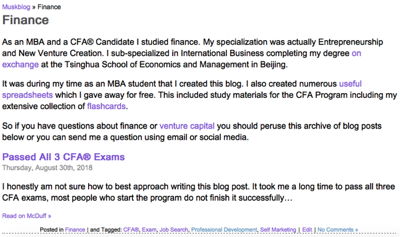Optimal WordPress Taxonomy
July 18th, 2013
When I started blogging I didn’t give a lot of thought to “Optimal WordPress Taxonomy”. I’d probably never even heard the word “taxonomy” when I started blogging. When I started blogging, WordPress didn’t even have tags, now years later I have to invest considerable time and effort optimizing my WordPress taxonomy.
What is a Taxonomy?
First of all taxonomy is a fancy word for tags and categories. The use of tags and categories in WordPress helps you organize and even focus your writing, focus + repetition = #winning. Tags and categories also help people find your posts and read them, they even help search engines index your content. Alas spammers have abused WordPress just like they’ve abused so many technologies, as a result Google and other search engines have added duplicate content penalties.
Optimizing Blog Archives
These duplicate content penalties may be affecting the performance of your old blog posts in search engines. WordPress has several types of archives, they are mostly based on your website’s taxonomy. In order to avoid duplicate content penalties ‘experts’ are now advising you disable some of these archives or at least use plugins and sitemaps to prevent them from being indexed and included in search engine results.
Optimizing My Taxonomy
You do want Googlebot to love you don’t you? If you’re going to claim authorship of your blog, you might as well give some thought to optimizing your WordPress taxonomy. Experts are now advising 7-8 high level categories with individual posts being in only 1 or 2 categories. For analytics a post being in exactly one category is best. My blog has been online since 2005, a lot has happened to me in that time, categories I set up and used while I lived in China, don’t get used much anymore. This means in order to have anywhere near an optimal WordPress taxonomy I have to remove categories and re-categorized 100s of posts.
Things are actually much worse for me, the same ‘experts’ advise only using a few tags per post. When tags were added to WordPress I and others perhaps went a little crazy adding them to our posts. I’m going to have to convert some of my old categories into tags and go through 100s of posts again, ensuring I only use a few tags per post and that I reuse certain tags strategically.
Taxonomy can help your Personal Brand
A lot gets written about managing your brand online whether you’re a corporation or an individual, what gets returned when someone Google’s your name matters. It can mean the difference between getting a job, or a date, or a sale. Experts have long advised not posting stuff to the Internet you don’t want found by Google and thus your future boss. I like many people, have done and said things I regret. I’ve apologized. I’ve tried to make amends. Others are less interested in maintaining a good relationship and reputation. I have to realize what assholes they are and avoid them. I also have to try harder not drag personal problems into the glare of the Internet.
If you’re like me you’ll want to regularly monitor the Google search results for your name. Only the first page or so truly matters, but people also use sites like Facebook, LinkedIn, and Pipl.com to form opinions about you. You should check what those websites have to say as well. If you find anything you don’t like you should take it down or ask to have it taken down. Some people resort to threatening people to have content taken down. That can work, but it can also make an even bigger mess something Michael Crook had to learn the hard way.
Trust me, you want to avoid learning the hard way.
Managing Your Brand Online
Once you’ve gotten the content you don’t want appearing in Google off the Internet you are back to managing your brand online proactively. Lots of people Google themselves but far less work to have “good” or “valuable” content appear in their search engine results. This is where your blog and optimal WordPress taxonomy rejoin our story. In addition to diligently policing your search engine results for undesirable data you have to provide positive alternatives and encourage Googlebot and his little bot buddies to index and return what you want other people to find about yourself.
This means choosing what you publish online more carefully, choosing which pictures you share and with whom. It also means you have to be thoughtful in choosing the 8-10 categories you want your blog focussed around and the 3-5 tags you want to apply to each post. It also means I’m going to have spend many, many hours editing, deleting, and re-categorizing blog posts.
ROI of SEO
Will it all be worth it, are the experts correct, can an optimal taxonomy and the correct combination of plugins improve your blogs traffic and search engine results? I’ve put so much effort into this blog over the years and honestly it hasn’t been worth it, but I keep trying to find the right combination of words that yields the desired results. Alas I’ve been trying for so long I’m not even sure what the desired results are anymore. I’m pretty sure I don’t want to be popular or famous.
These are the categories I decided to go with in 2013:
- Canada
- East Asia
- Everything Else
- Finance
- Gaming
- IT
- Marketing
- MBA
- Sports
- The Arts
Ongoing Taxonomy Optimization
Almost two years later and I now may have an optimal taxonomy. I spent entirely too much time in the last two days going through every single tag in my WordPress blog. Many were deleted, once again entire posts were deleted, typos were fixed, tags were amalgamated and now I and maybe even the rest of the world through the search engines will have an even better idea about what my blog is about.
My life still is not great, I am living in China again and as a result China is my number one tag. That isn’t so bad and I’ve gotten rid of a lot of the dubious and ill advised content, but as always the key is to emphasize the positive, bring your best content to the forefront, try to sell yourself a little more especially when your career continues to not go well. Following Malcolm Gladwell’s 10,000 hours theory I have achieved expert blogger, webmaster, coder, writer, search engine optimizer, and marketer status, now if only someone would pay me for my expertise.
Search Engine Optimization Never Stops
Even more time has passed and I have made many passes through my blog improving old posts and deleting substandard ones. I’ve added and removed tags even revised my categories slightly. As always, all the effort was not worth it, I am still looking for a better job, still in Shanghai China and still should be studying for the final CFA® exam. I’ve had to spend valuable study time reclaiming my intellectual property. I’ve hopefully improved my blog and taxonomy even further to make myself more appealing to potential employers, alas I’m getting old and I am struggling to sell myself. Hopefully passing a couple more certification exams will make a difference, more of a difference than 1000 blog posts.

Optimal is Illusive
In 2019 I performed the most extensive overall yet to try and improve the Quality of this blog. As I was getting closer and closer to being done I realized my taxonomy, specifically my categories may be holding me back. Experts advise having fewer categories than I was using and worse some of my categories had almost 200 posts whereas others had little over 20. I’m not sure how bad this truly is for my search engine optimization and I was actually pretty proud of all the work I’d done to improve this blog, but once again I’m thinking of going through every post that remains online and changing the categories and tags.
New Proposed Categories
I thought about the following categories with “Rambles” being the default or uncategorized category. Alas, I have too many posts that would fit into this category so I needed to add one more category and I opted for “Technology” as that is currently my most populous category and I guess rambles about technology can go there, similarly “Advice” may be too general and is not a keyword I particularly care about.
- Advice
- DIY & Hobbies
- Personal Improvement
- Rambles
- Reviews
- Technology
- Travel
Currently Finance and Entrepreneurship are popular categories but they do not have that many posts in them, they could become tags. I still try to have three tags or at least no more than five tags per post. I also wrote more elaborate category descriptions and heavily modified my WordPress theme in 2019. I’m not in a hurry to change the categories of the majority of my posts again anytime soon. I have a hard time seeing a positive ROI from this effort for anything but “Travel” and “Hobby” or “DIY” posts. If you have any thoughts on optimizing a WordPress taxonomy you can leave them below.
In 2024 I spent considerable time updating old blog posts and implementing the taxonomy I proposed six years earlier. I don’t have a lot of optimism about the ROI, but I think fixing busted links along with grammar and spelling mistakes does improve the Quality. I also added more old pictures, this time hosting most on Flickr.
This entry was originaly posted on , it was last edited on and is filed under: Advice and tagged: Blogging, SEO, Taxonomy.


thanks, all that i need to optimization my blog
It doesn’t matter how optimized your blog is, if you don’t write about something people care about, you’re largely engaging in typing practice.
Cheers,
I think I’m going to have to remove MBA entirely and put the Internet back in.